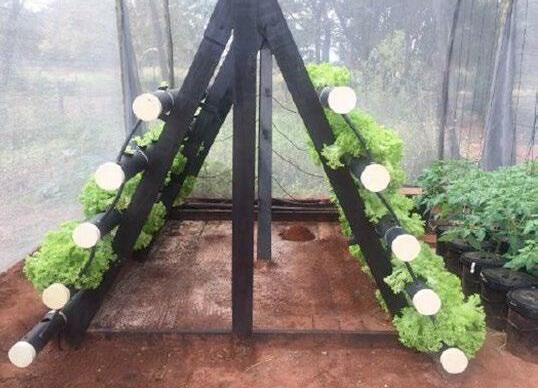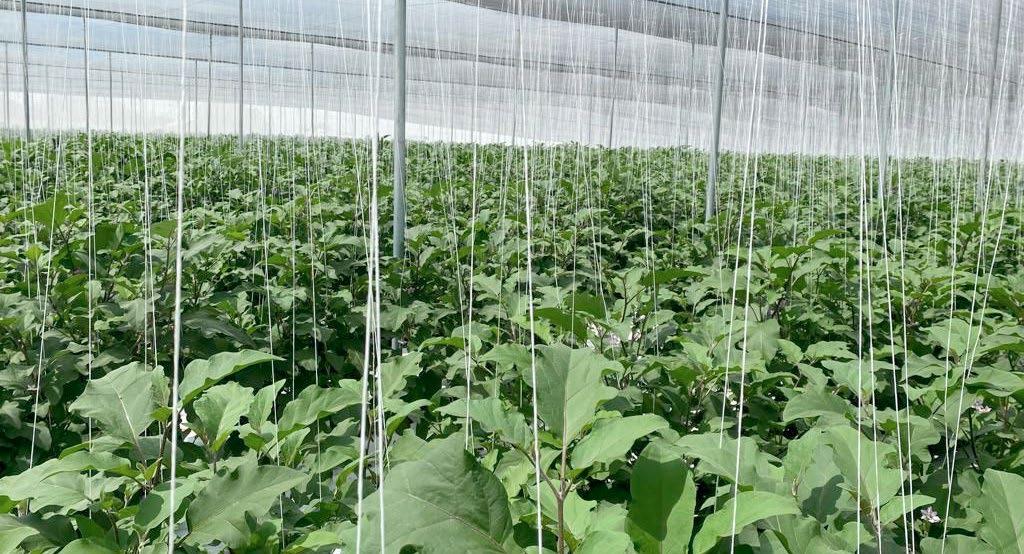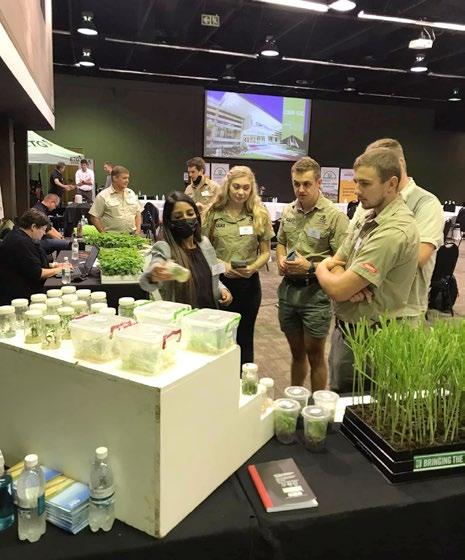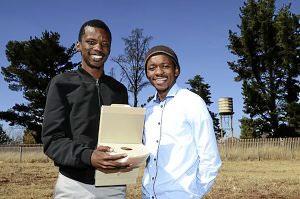
6 minute read
New young entrants to the Greenhouse industry welcomed
Climate change will have drastic impacts on South Africa’s economy and society and the need to adapt is urgent.
As the country embarks on a just transition to a lowcarbon, climate-resilient and environmentally-sustainable economy, an opportunity exists to develop domestic small, green businesses. This case study forms part of a broader initiative on small business development in South Africa’s climate change space. It presents the journey and experience of Mogale Maleka and Tumelo Pule, two South African engineers active in the climate change adaptation space. Mogale Maleka and Tumelo Pule met while studying mechanical engineering at the University of Johannesburg (UJ), and together developed the idea of using hydroponic technology to foster efficient farming solutions for fresh produce. Despite the stigma associated with farming by young people, who gravitate towards professional careers, the team embraced hydroponic farming as a career path while in their 20s. HydroponicS technology complements their engineering skills and is a unique application through which they can harness the technical knowledge gained during their tertiary education. Maleka and Tumelo Pule, under the auspices of AB Farms (an agricultural tech company), looked at a way to upscale the system for small scale and commercial farming and approached UJ-PEETS for assistance to improve the irrigation system. Vertical pipe systems for small scale commercial farming on the market generally do not have a water storage capacity incorporated in their designs. Irrigating systems therefore have to run continuously to prevent the plant roots from becoming dry and hindering plant growth or killing the plant. Electricity in South Africa is becoming more and more expensive and more unreliable due to power failures making it economically unsustainable to operate hydroponic systems continuously over extended periods of time. With the assistance of funding from UJ-PEETS, Maleka and Pule designed the prototype that allows culinary plants to be irrigated periodically, thereby reducing energy use and allowing mineral solution to flow through to individual plants. According to Mogale Maleka: “Given its ability to store water within the design, it will reduce the amount of energy required to grow produce while simultaneously increasing the planting density per square meter, thus reducing costs and increasing production capacity. The system allows plants to have access to water continuously even when the irrigation system is off (due to power failures, pump failure etc). It also allows for the reuse/recycling of the irrigating water thereby saving water, fertilizers and electricity.” Mogale Maleka and Tumelo Pule: Using hydroponics to enhance food security. Before entering the space commercially, the team researched the field heavily, seeking to understand current developments in hydroponic technology and the outlook for the market. With increased urbanisation, land access issues, and water security concerns, the pair felt passionate about being in the field and this formed the basis on which AB Farms was built.
Advertisement
AB Farms is a small agri-tech business aimed at developing hydroponic farming solutions and providing fresh produce. Venturing into this market segment is a tall order, given the competitiveness of established fresh produce value chains. Originally, the team focused solely on hydroponics farming. In pursuing this, they soon realised that increasing the footprint of the technology would require tailoring planting solutions to local contexts. The firm then added a second stream of work focusing on research and development of hydroponic models for farming in South Africa.
AB Farms as a business is split into two: on the one hand, it develops and tests hydroponic models, and on the other hand, it practices hydroponic farming.
HARNESSING HYDROPONICS
Hydroponics farming is an innovative and high-tech approach to farming without
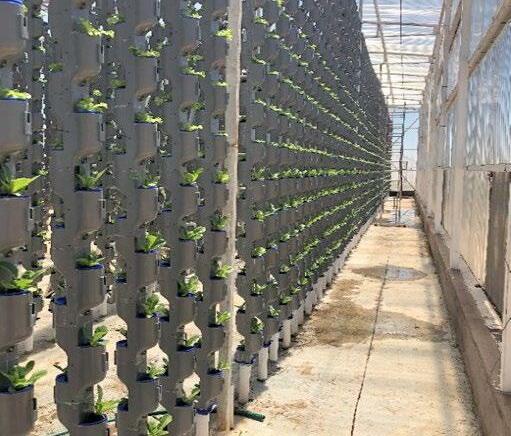
the need for soil as a growing medium. Water is circulated among plants in this system and only the water that is either absorbed by plants or evaporates is replaced. The system is more water efficient than traditional irrigation. Without soil in hydroponic farming, soilbased costs, such as tilling, de-weeding and pesticides, are limited. This can result in lower than traditional operating costs and a healthier produce with limited or no pesticides. Hydroponic farming is ideal for growing fruit and vegetables with small root space, such as lettuce, kale, mint, tomato, pepper, cucumber and strawberries.
Soon after the firm was started. In January 2017, the state-funded Westonaria Agri-Park in Western Gauteng was addressing issues with hydroponic vertical farming in the park. The park’s managers wished to optimise the existing system for greater efficiency, as the park recurrently dealt with power and water cuts, with substantial negative impact on crop productivity. AB Farms was selected as the ideal candidates to assist and has been working with the Agri-Park since late 2017 to make its systems more efficient. The Agri-Park then became the home of AB Farms, providing the business with some access to financing, as well access to farming land, discounted rent and common cleaning and security staff. Using a business incubation approach, the Agri-Park pools small-scale farmers and provides infrastructure for the farmers to undertake their agricultural activities as well as co-learn from each other.
As the result of challenges with the Agri-Park hydroponic system originally installed, the entrepreneurs had to adapt that system to suit the local context, so as to enhance its operability and economic viability. In developed countries, water pumps, for example, run continuously thanks to affordable and reliable electricity. This allows the on-going mixing of nutrients and fertilisers, which is good for the plants. In South Africa, however, power cuts jeopardise the system. Due to such disruptions, plants end up not receiving adequate nutrients and water as the electrical pumps will not be running. This significant impairs crop growth and productivity. Such negative impacts can be mitigated by employing other improvised solutions, like using generators to drive the pumps, which is costly and drives up operational costs. Hydroponic designs from international suppliers also tend to be high-tech and highly costly, which increases the costs of a business. In the local market, the extent to which these costs can be passed on to consumers is limited.
AB Farms is also developing a vertical bucket system that allows the plant to have access to a mineral solution continuously even though the irrigating system may be off due to power shortages, pump failure or any other reason.
The design essentially allows for plants to be irrigated periodically, as opposed to continuously, thus reducing the amount of energy required per kilogram produced. In addition, the design allows the mineral solution to flow through it in such a manner that allows for the natural aeration of the mineral solution.
The business is moving away from the fresh market model to established and fixed supply contracts with private clients, large retailers, and other large consumers, such as hotels and restaurants.
Such private clients provide the advantage of better payment terms as well as certain and consistent revenue streams. While the firm is making strides by engaging with established packhouses, major retailers are still difficult to reach. Large consumers tend to contract with established and large farmers due to scale and quality requisites, squeezing out smaller players who are unable to meet these requirements. Entering the value chain is hard but necessary for a small business to grow and for the technology to proliferate. Starting small with the little you have, but the will to work hard, exceed and in good time expand, will put the newcomer hydroponics farmer in a position where he or she build up a relationship with a financial institution that acknowledges the return on investment, and so grow the business. Source: From a Flanders Case Study on AB Farms and University of Johannesburg.
